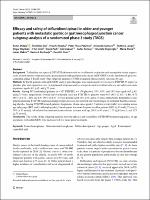| dc.contributor | Vall d'Hebron Barcelona Hospital Campus |
| dc.contributor.author | Shitara, Kohei |
| dc.contributor.author | Doi, Toshihiko |
| dc.contributor.author | Hosaka, Hisashi |
| dc.contributor.author | Santoro, Armando |
| dc.contributor.author | Longo-Muñoz, Federico |
| dc.contributor.author | Alsina Maqueda, Maria |
| dc.contributor.author | Thuss-Patience, Peter |
| dc.date.accessioned | 2022-09-09T07:12:40Z |
| dc.date.available | 2022-09-09T07:12:40Z |
| dc.date.issued | 2022-05 |
| dc.identifier.citation | Shitara K, Doi T, Hosaka H, Thuss-Patience P, Santoro A, Longo F, et al. Efficacy and safety of trifluridine/tipiracil in older and younger patients with metastatic gastric or gastroesophageal junction cancer: subgroup analysis of a randomized phase 3 study (TAGS). Gastric Cancer. 2022 May;25:586–97. |
| dc.identifier.issn | 1436-3305 |
| dc.identifier.uri | https://hdl.handle.net/11351/8082 |
| dc.description | Age groups; Gastrointestinal neoplasms; Trifluridine |
| dc.description.abstract | Background
Trifluridine and tipiracil (FTD/TPI) demonstrated survival benefit vs placebo and manageable safety in previously treated patients with metastatic gastric/gastroesophageal junction cancer (mGC/GEJC) in the randomized, placebo-controlled, phase 3 TAGS study. This subgroup analysis of TAGS examined efficacy/safety outcomes by age.
Methods
In TAGS, patients with mGC/GEJC and ≥ 2 prior therapies were randomized (2:1) to receive FTD/TPI 35 mg/m2 or placebo, plus best supportive care. A preplanned subgroup analysis was performed to evaluate efficacy and safety outcomes in patients aged < 65, ≥ 65, and ≥ 75 years.
Results
Among 507 randomized patients (n = 337 FTD/TPI; n = 170 placebo), 55%, 45%, and 14% were aged < 65, ≥ 65, and ≥ 75 years, respectively. Overall survival hazard ratios for FTD/TPI vs placebo were 0.67 (95% CI 0.51–0.89), 0.73 (95% CI 0.52–1.02), and 0.67 (95% CI 0.33–1.37) in patients aged < 65, ≥ 65, and ≥ 75 years, respectively. Regardless of age, patients receiving FTD/TPI experienced improved progression-free survival and stayed longer on treatment than those receiving placebo. Among FTD/TPI-treated patients, frequencies of any-cause grade ≥ 3 adverse events (AEs) were similar across age subgroups (80% each), although grade ≥ 3 neutropenia was more frequent in older patients [40% (≥ 65 and ≥ 75 years); 29% (< 65 years)]; AE-related discontinuation rates did not increase with age [14% (< 65 years), 12% (≥ 65 years), and 12% (≥ 75 years)].
Conclusions
The results of this subgroup analysis show the efficacy and tolerability of FTD/TPI treatment regardless of age in patients with mGC/GEJC who had received 2 or more prior treatments. |
| dc.language.iso | eng |
| dc.publisher | Springer |
| dc.relation.ispartofseries | Gastric Cancer;25 |
| dc.rights | Attribution 4.0 International |
| dc.rights.uri | http://creativecommons.org/licenses/by/4.0/ |
| dc.source | Scientia |
| dc.subject | Esòfag - Càncer - Tractament |
| dc.subject | Quimioteràpia combinada |
| dc.subject.mesh | Esophageal Neoplasms |
| dc.subject.mesh | /drug therapy |
| dc.subject.mesh | Antineoplastic Combined Chemotherapy Protocols |
| dc.title | Efficacy and safety of trifluridine/tipiracil in older and younger patients with metastatic gastric or gastroesophageal junction cancer: subgroup analysis of a randomized phase 3 study (TAGS) |
| dc.type | info:eu-repo/semantics/article |
| dc.identifier.doi | 10.1007/s10120-021-01271-9 |
| dc.subject.decs | neoplasias del esófago |
| dc.subject.decs | /farmacoterapia |
| dc.subject.decs | protocolos de quimioterapia antineoplásica combinada |
| dc.relation.publishversion | https://doi.org/10.1007/s10120-021-01271-9 |
| dc.type.version | info:eu-repo/semantics/publishedVersion |
| dc.audience | Professionals |
| dc.contributor.organismes | Institut Català de la Salut |
| dc.contributor.authoraffiliation | [Shitara K, Doi T] Department of Gastrointestinal Oncology, National Cancer Center Hospital East, Kashiwa-shi, Japan. [Hosaka H] Department of Gastroenterology, Gunma Prefectural Cancer Center, Ota, Gunma, Japan. [Thuss-Patience P] Medizinische Klinik m.S. Hämatologie, Onkologie und Tumorimmunologie, Charité-Universitätsmedizin Berlin, Berlin, Germany. [Santoro A] Department of Biomedical Sciences, Humanitas University, Milan, Italy. IRCCS Humanitas Research Hospital, Humanitas Cancer Center, Milan, Italy. [Longo F] Medical Oncology, Hospital Universitario Ramon y Cajal, IRYCIS, CIBERONC, Madrid, Spain. [Alsina M] Servei d’Oncologia Mèdica, Vall d’Hebron Institute of Oncology (VHIO), Barcelona, Spain |
| dc.identifier.pmid | 34997449 |
| dc.identifier.wos | 000740186000001 |
| dc.rights.accessrights | info:eu-repo/semantics/openAccess |

